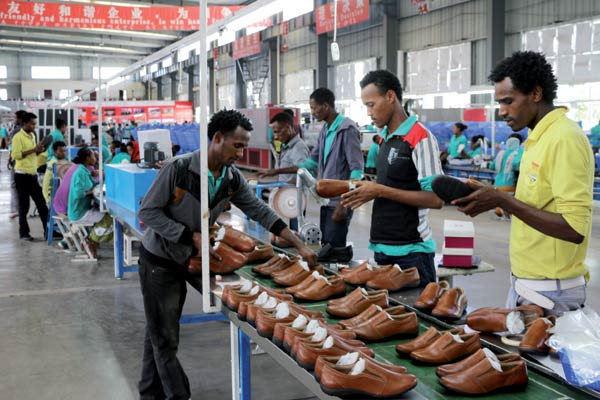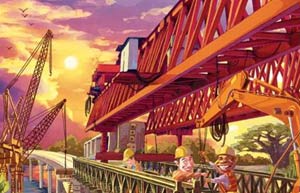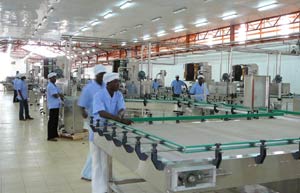 |
|
Workers operate on the production line in the Dukem, Addis Ababa, workshop of Huajian International Shoe City (Ethiopia) Plc. CHEN WEIHUA/CHINA DAILY |
Chinese shoe producer has ambitious plan for expansion in Ethiopia
The huge Huajian shoe factory, on the outskirts of Ethiopia's capital, Addis Ababa, comes to life about 6:30 am.
Hundreds of workers dressed in green T-shirt uniforms arrive for breakfast by bus from the nearby towns of Dukem and Debre Zeit.
A dozen or so young men finish their meals quickly and head to the basketball court outside the main building; others play football on open ground nearby.
Work starts for everyone at 7:40 am sharp. The noise levels pick up as the 3,200 local workers, and another 170 from China, get down to the serious business of cutting, gluing and stitching nearly 6,000 pairs of quality shoes each day.
Huajian International Shoe City (Ethiopia) Plc, to give it its full title, is the largest employer in the Eastern Industry Zone, a site 37 km from the city center, which is also home to another 20 Chinese manufacturers.
 |

|
It now makes 180,000 pairs of shoes a month, that is about 2 million a year, says Jack Song, its deputy general manager, most of which are exported to the high-paying markets of the US and European markets under brand names such as Guess, Nine West and Naturalizer.
Its Chinese parent Huajian Group makes more than 20 million pairs annually.
Huajian is one of a growing number of Chinese manufacturers seeking to go global, in an effort to counter rising labor and raw material costs back home, which are not being helped by the appreciation of the yuan.
But this investment in Ethiopia was a bit special. It came with the personal invitation of its late Prime Minister Meles Zenawi.
During a trip to China in August 2011, Zenawi asked Zhang Huarong, who built the company from scratch in the 1980s, to open a labor-intensive shoe manufacturing plant in his country, the second most populous nation in Africa, with 92 million people.
Ethiopian workers cost a 10th of the price of those in China and its government, like several others in Africa, is positioning itself as the perfect relocation spot for labor-intensive Chinese manufacturers, as they face rising wages at home.
Some estimates suggest as many as 80-100 million Chinese workers could be moved by their employers to lower their cost bases.
Ethiopia offers low or zero tariffs on imported manufactured goods, and tax holidays of up to seven years to those prepared to move into the Eastern Industry Zone, the country's first dedicated industrial park.
For Huajian, which uses quality leather, the fact that Ethiopia is also home to Africa's largest livestock population, meant the country was too good to resist.
The company has now secured 138 hectares of land in the Lafto area of Addis Ababa, on which it plans to build a mixed-use complex, encompassing not only its own light industry site, but residential, hotel and entertainment.
This new facility will be built over the next decade and be 10 times bigger than its current site, employing a target workforce of 50,000 people.
Nara Zhou, Huajian's public relations manager and assistant to the company president, calls its design futuristic, and in sharp contrast to the typical Addis industrial building.
She also describes it as "the future" of Huajian.
"It's very meaningful to be working on this project," says Zhou, 27, who graduated in international trade from Hunan University.
